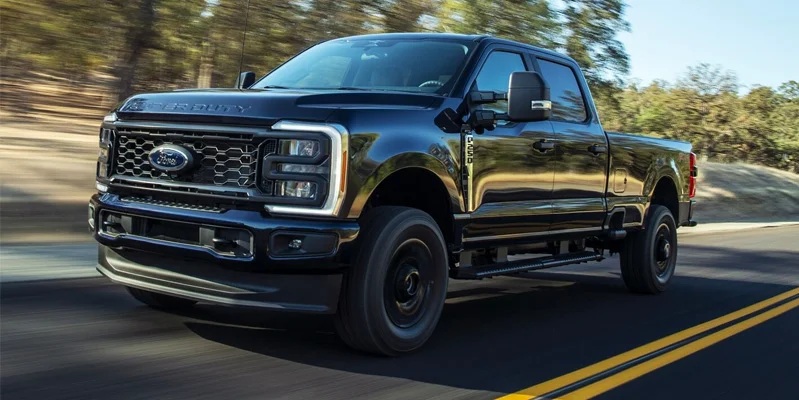2024 Ford F-350 Towing Capacity Chart: Find The Right Truck
The Ford F-350 Super Duty continues to set the standard for heavy-duty towing capability in the pickup truck segment. As part of the Ford Super Duty lineup, the F-350 is engineered specifically for those with demanding towing requirements, offering exceptional capacity across various configurations. Understanding the specific towing capabilities based on powertrain, cab configuration, axle […]
The Ford F-350 Super Duty continues to set the standard for heavy-duty towing capability in the pickup truck segment. As part of the Ford Super Duty lineup, the F-350 is engineered specifically for those with demanding towing requirements, offering exceptional capacity across various configurations. Understanding the specific towing capabilities based on powertrain, cab configuration, axle ratio, and other factors is essential for selecting the right truck to meet your needs.

Engine Options and Their Impact on Towing
The F-350 is available with three powerful engine options, each delivering different towing capabilities:
- 6.8L V8 Gasoline Engine: The standard powerplant produces 405 horsepower and 590 Nm of torque, providing solid baseline towing performance.
- 7.3L V8 “Godzilla” Gasoline Engine: This larger displacement V8 generates 430 horsepower and 644 Nm of torque, offering enhanced towing capability for those who prefer gasoline power.
- 6.7L Power Stroke V8 Turbo Diesel: The flagship diesel option delivers 475 horsepower and an impressive 1,423 Nm of torque, enabling the highest towing ratings in the lineup.
All engines pair with a heavy-duty 10-speed TorqShift automatic transmission, specifically calibrated for towing applications.
Conventional Towing Capacity Chart
The conventional towing capacity (using a standard hitch) varies significantly based on configuration:
| Configuration | 6.8L V8 Gas | 7.3L V8 Gas | 6.7L Diesel |
| Regular Cab, 2WD, 3.55 axle | 8,845 kg | 9,072 kg | 10,206 kg |
| Regular Cab, 2WD, 4.30 axle | 9,979 kg | 10,433 kg | 10,206 kg |
| Regular Cab, 4WD, 3.55 axle | 8,618 kg | 8,845 kg | 9,979 kg |
| Regular Cab, 4WD, 4.30 axle | 9,752 kg | 10,206 kg | 9,979 kg |
| SuperCab, 2WD, 3.55 axle | 8,618 kg | 8,845 kg | 9,979 kg |
| SuperCab, 2WD, 4.30 axle | 9,752 kg | 10,206 kg | 9,979 kg |
| SuperCab, 4WD, 3.55 axle | 8,391 kg | 8,618 kg | 9,752 kg |
| SuperCab, 4WD, 4.30 axle | 9,525 kg | 9,979 kg | 9,752 kg |
| Crew Cab, 2WD, 3.55 axle | 8,391 kg | 8,618 kg | 9,752 kg |
| Crew Cab, 2WD, 4.30 axle | 9,525 kg | 9,979 kg | 9,752 kg |
| Crew Cab, 4WD, 3.55 axle | 8,165 kg | 8,391 kg | 9,525 kg |
| Crew Cab, 4WD, 4.30 axle | 9,299 kg | 9,752 kg | 9,525 kg |
Fifth-Wheel/Gooseneck Towing Capacity
For fifth-wheel or gooseneck towing, which typically allows for higher capacities, the numbers increase substantially:
| Configuration | 6.8L V8 Gas | 7.3L V8 Gas | 6.7L Diesel |
| Regular Cab, 2WD, DRW | 12,247 kg | 13,608 kg | 16,783 kg |
| Regular Cab, 4WD, DRW | 12,020 kg | 13,381 kg | 16,329 kg |
| SuperCab, 2WD, DRW | 12,020 kg | 13,381 kg | 16,329 kg |
| SuperCab, 4WD, DRW | 11,793 kg | 13,154 kg | 15,876 kg |
| Crew Cab, 2WD, DRW | 11,793 kg | 13,154 kg | 15,876 kg |
| Crew Cab, 4WD, DRW | 11,567 kg | 12,927 kg | 15,422 kg |
| Regular Cab, 2WD, SRW | 10,886 kg | 11,340 kg | 12,701 kg |
| Regular Cab, 4WD, SRW | 10,659 kg | 11,113 kg | 12,474 kg |
| SuperCab, 2WD, SRW | 10,659 kg | 11,113 kg | 12,474 kg |
| SuperCab, 4WD, SRW | 10,433 kg | 10,886 kg | 12,247 kg |
| Crew Cab, 2WD, SRW | 10,433 kg | 10,886 kg | 12,247 kg |
| Crew Cab, 4WD, SRW | 10,206 kg | 10,659 kg | 12,020 kg |
*DRW = Dual Rear Wheel, SRW = Single Rear Wheel
Factors That Affect Towing Capacity
Several key factors influence the maximum towing capacity of an F-350:
- Wheelbase Length: Longer wheelbase models generally offer greater stability and higher towing capacities.
- Axle Ratio: Higher numerical ratios (like 4.30) provide more torque multiplication for improved towing, but at the expense of fuel efficiency.
- Dual Rear Wheels vs. Single Rear Wheels: Dual rear wheel (DRW) configurations substantially increase towing capacity by providing a wider, more stable platform.
- Payload Package: The available high-capacity payload package increases the truck’s structural reinforcement and spring rates, enhancing towing capability.
- Fifth-Wheel/Gooseneck Prep Package: Factory-installed mounting points and wiring improve towing safety and capability for these specialized hitches.
Towing Technology Features
The F-350 incorporates advanced towing technologies to enhance capability and safety:
- Pro Trailer Backup Assist: Simplifies reversing with a trailer by allowing the driver to steer the trailer with a dedicated knob.
- Trailer Reverse Guidance: Offers multiple camera views and visual guides to aid in trailer maneuvering.
- Integrated Trailer Brake Controller: Factory-installed system that synchronizes vehicle and trailer brakes for smoother, more controlled stops.
- Smart Trailer Tow Connector: Monitors trailer lighting and alerts the driver to connectivity issues or bulb failures.
- Trailer Sway Control: Works with the stability control system to detect and minimize trailer sway.
Top 5 Best Features of the 2024 Ford F-350 Towing
- Class-Leading Diesel Towing Capacity – The 6.7L Power Stroke diesel engine enables maximum fifth-wheel/gooseneck towing of up to 16,783 kg when properly configured, representing the highest capacity in its class.
- 10-Speed TorqShift Transmission – Specifically engineered for heavy-duty applications with advanced towing modes that optimize shift points when hauling heavy loads.
- Integrated Trailer Brake Controller – Factory-installed system allows for seamless coordination between truck and trailer braking systems, with customizable settings accessible through the instrument cluster.
- Ultimate Trailer Tow Camera System – Provides up to seven camera views, including 360-degree coverage, rear trailer view, and split-view capabilities to maximize visibility when maneuvering with a trailer.
- Onboard Scales with Smart Hitch – Measures approximate payload and tongue weight to help prevent overloading, displaying the information in the instrument cluster, on the infotainment screen, or through the Ford App smartphone app.
5 Facts About The 2024 Ford F-350 Towing Capacity
- The F-350 with maximum towing configuration can pull the equivalent weight of approximately eight adult African elephants.
- Engineers tested the F-350 towing capabilities in extreme conditions, including the Davis Dam grade in Arizona, where temperatures regularly exceed 40°C while climbing a 7% grade.
- The F-350 frame utilizes up to 95% high-strength steel, which is significantly stronger than that of previous generations, allowing for increased capabilities without excessive weight gain.
- When equipped with the 6.7L Power Stroke diesel, the cooling system can reject enough heat to warm five average-sized homes in winter.
- The development team for the Super Duty accumulated more than 32 million kilometers of testing data, with a significant portion focused specifically on towing reliability and durability.
Questions and Answers About 2024 Ford F-350 Towing Capacity
What is the maximum conventional towing capacity of the Ford F-350?
- The maximum conventional towing capacity is 10,433 kg when equipped with the 7.3L V8 gasoline engine, Regular Cab, 2WD configuration, and 4.30 axle ratio.
How does the 6.7L Power Stroke diesel affect towing capacity compared to gasoline engines?
- It significantly increases fifth-wheel/gooseneck towing capacity, offering up to 16,783 kg of capability compared to the maximum 13,608 kg with the 7.3L gasoline engine. The diesel’s massive 1,423 Nm of torque provides superior pulling power, especially when starting from a stop or climbing grades.
What configuration provides the highest overall towing capacity for the F-350?
- The highest towing capacity is with a Regular Cab, 2WD, Dual Rear Wheel configuration with the 6.7L Power Stroke diesel engine, which can tow up to 16,783 kg with a fifth-wheel or gooseneck hitch.
Does choosing a Crew Cab significantly reduce the towing capacity?
- Yes, opting for a Crew Cab does reduce the towing capacity. For example, with the 6.7L diesel and DRW configuration, moving from a Regular Cab to a Crew Cab reduces the maximum fifth-wheel/gooseneck capacity from 16,783 kg to 15,876 kg (2WD) – a difference of 907 kg.
How do Single Rear Wheel (SRW) and Dual Rear Wheel (DRW) configurations compare for towing?
- Dual Rear Wheel configurations offer substantially higher towing capacities. For instance, a Crew Cab 4WD with the 6.7L diesel has a maximum fifth-wheel capacity of 12,020 kg with SRW but increases to 15,422 kg with DRW – a 3,402 kg improvement.
What axle ratio is best for maximum towing capacity?
- The 4.30 axle ratio typically provides the highest towing capacity for conventional towing with gasoline engines. However, the diesel engine is often paired with a 3.55 ratio for optimal balance of towing capability and efficiency.
Does the F-350 require a Commercial Driver’s License (CDL) to operate at maximum capacity?
- Regulations vary by region, but generally, a CDL may be required when the combined weight of the truck and trailer exceeds 11,793 kg. Many maximum-capacity configurations with a fully loaded trailer would exceed this threshold.
How does the F-350 towing capacity compare to previous model years?
- The latest F-350 maintains the significant capability increases introduced in the 2023 model year redesign, with maximum towing capacities approximately 10% higher than pre-2023 models, thanks to structural reinforcements and powertrain improvements.
What additional equipment do you need for maximum towing capacity?
- For maximum towing, Ford recommends the Heavy-Duty Trailer Tow Package, which includes an enhanced radiator, an upgraded rear axle, an integrated trailer brake controller, and a specialized trailer hitch receiver. For fifth-wheel/gooseneck towing, the dedicated prep package with factory-installed hitch is strongly recommended.
How does payload capacity relate to towing capacity on the F-350?
- Available payload capacity directly affects towing capability, as the tongue weight of the trailer counts against the truck’s payload rating. Typically, conventional trailers apply 10-15% of their weight as tongue weight, while fifth-wheel/gooseneck trailers apply 15-25% of their weight to the truck. The maximum payload capacity ranges from approximately 2,268 kg to 3,401 kg, depending on configuration.




